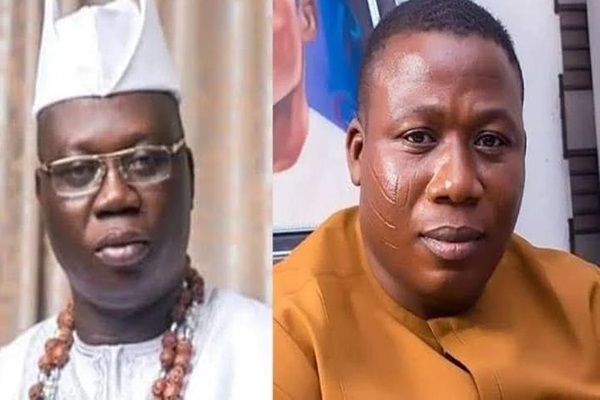By ISAAC PEACE
Contemporary figures of Gani Adams and Sunday Igboho drew compelling parallels to the legendary Yoruba warriors, Gbonka and Timi. Both pairs represent significant forces within their respective eras, known for their influence and efforts in defending their people and culture. While the historical context differs, the core dynamics of power, resistance, and cultural advocacy remain strikingly similar. The end of the story served as a warning to the cold war currently brewing between these two Yoruba personae. I do know that some are divided in their support for one over the other and most worrisome is the silence of our elders in the face of the impending hostility cooking between the two warriors. This article intends to draw the attention of our elders and prominent Omoluwabi to as a matter of urgency intervene in this show of strength between the two and make concerted efforts toward reconciling them or at best, ensuring they sheath their swords.
Gani Adams: The Modern Gbonka
Gani Adams, the Aare Ona Kakanfo of Yoruba land, embodies the spirit of Gbonka, a renowned war chief in Yoruba history. As a prominent figure in the Oodua People’s Congress (OPC), Adams has long been a staunch advocate for the Yoruba people, fighting for their rights and preservation of their culture. His position as Aare Ona Kakanfo, a traditional title historically bestowed upon the head of the Yoruba military, further cements his role as a protector and leader within the community.
Sunday Igboho: The New Timi
Sunday Igboho, another influential figure, mirrors the legendary warrior Timi. Known for his boldness and willingness to confront perceived injustices, Igboho has risen to prominence through his activism against the Fulani herdsmen’s incursions in Yoruba land. His efforts to protect Yoruba farmers and communities from violent clashes have garnered him widespread support, positioning him as a modern-day defender of Yoruba land.
Historical Parallels: Gbonka and Timi
In Yoruba mythology, Gbonka and Timi were formidable warriors who served under different rulers and engaged in a legendary duel. Gbonka, known for his unwavering loyalty and strategic prowess, was a key figure in stabilizing Oyo Empire’s military might. Timi, equally valiant, represented strength and valor, often standing up against oppressive forces. Their legendary clash symbolizes the inevitable tension between two powerful entities fighting for what they believe is right. This dynamic resonates with the contemporary situation between Gani Adams and Sunday Igboho, where both figures, despite their shared goal of protecting Yoruba interests, occasionally find themselves at odds due to differing approaches and philosophies. While Gani Adams operates within the traditional structures, emphasizing cultural heritage and organized resistance, Sunday Igboho’s methods are direct and confrontational, often bypassing established protocols to achieve immediate results. This difference in approach can lead to friction, reminiscent of the Gbonka and Timi saga, where two mighty forces collide not out of personal animosity, but due to their unique methods of achieving a common goal.
The story of Gani Adams and Sunday Igboho, akin to the legend of Gbonka and Timi, underscores the complexities of leadership and advocacy within a cultural context. Both historical and contemporary figures highlight the importance of balancing traditional values with modern exigency. As Yoruba land navigates its challenges, the legacy of these warriors both past and present, serves as a reminder of the enduring struggle for justice, unity, and cultural preservation.
It is on this premise I seek a cessation of hostilities between them as continued hostility will lead to the decimation of their ranks and ultimately terminate their agitations which will serve the interest of the Yoruba traducers.
On this note, I call on our revered traditional rulers, Afenifere, and other elders to quickly rise to the occasion by ensuring that the case in court is withdrawn and the two gladiators should be made to sit together to iron out their respective differences. Achieving this will further preserve our rich tradition of our respect for elders and toeing the part of reasoning and also give us a united front in our agitation for a better interest of Yoruba people.
Dr Peace, an author and Environmental Resource Planner writes from Abuja.





